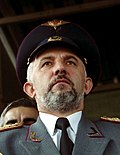27 January 1997 | |||||||||||||||||||||||||
Presidential election | |||||||||||||||||||||||||
| |||||||||||||||||||||||||
General elections were held in the Chechen Republic of Ichkeria, an unrecognized state considered a part of Russia under international law, on 27 January 1997 to elect the president and parliament. [1] The result of the presidential elections was a victory for Aslan Maskhadov. [2]



